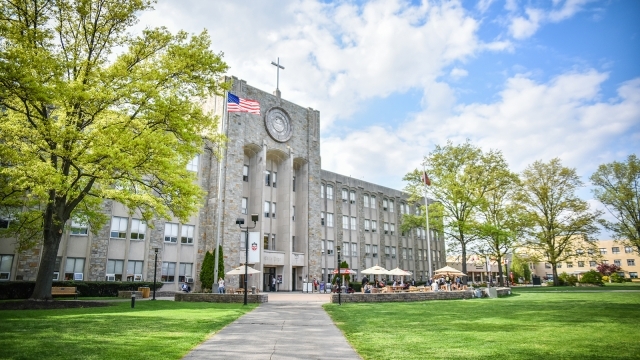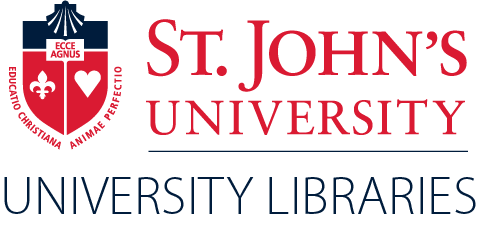

Antiracism Statement and Action Plan
- Home
- St. John's University Libraries
- About the Libraries
- Antiracism Statement and Action Plan

ACRL Diversity Alliance Institutional Member since 2023
The ACRL Diversity Alliance program unites academic libraries committed to increasing the hiring pipeline of qualified and talented individuals from underrepresented racial and ethnic groups. By working together and thinking more broadly, ACRL Diversity Alliance institutions will help diversify and thereby enrich the profession.
Learn More about the ACRL Diversity AllianceJoint Statement on Anti-Racism
The University Libraries, the Rittenberg Law Library, and the Kathryn & Shelby Cullom Davis Library are united in opposition to systemic racism and racial violence. Pope Francis reminds us that "we cannot tolerate or turn a blind eye to racism and exclusion in any form". Therefore, our libraries, in keeping with Catholic social justice teachings, must strive to affect the common good rather than claim a neutral stance. In support of St. John’s University’s community of students, researchers and scholars, we stand together in commitment as allies in the intentional pursuit of anti-racist practices, policies, and collections.
University Libraries Inclusivity, Diversity, Equity and Anti-Racism Committee (LIDEA)
In collaboration with the Dean of Libraries, the Libraries Inclusivity, Diversity, Equity and Anti-Racism Committee (LIDEA) will establish goals, objectives and an action plan that supports the University Libraries’ commitment to becoming an anti-racist institution in our collections, services, policies and spaces. The committee honors the broad definition of diversity which includes race, ethnicity, gender, sexual orientation, age and disabled persons with the aim of treating all with kindness, respect and dignity. LIDEA may be called upon to advise on policies and/or programs or workshops that enhance the understanding of and respect for diversity in the University Libraries to create an inclusive community. This work might also include ways to promote, recognize and celebrate inclusivity, equity, accessibility and anti-racism efforts within the Libraries. LIDEA will submit their annual goals, objectives and action plan for review to the Office of the Dean of Libraries no later than Oct 15 of every academic year [extended to December 1 for 2022], and will provide update reports on March 15, June 15, September 15 of each year. The committee will meet annually with the Dean of Libraries on or about October 15. Members of the committee will be appointed by the Dean for a two-year term renewable and will include faculty, administrators, staff and students.
Committee Membership:
Sharon Han, Brittany Partinico, Prof. Emma Quinn, Prof. Anthony Todman, Prof. Ben Turner (Chair)
2023-2026 LIDEA Goals/Objectives:
The committee has identified four areas within the University Libraries to address in regard to incorporation of IDEA practices and ethos: policies, services, collections, and spaces. These areas each have one goal, and several objectives set in order to meet those goals, which are:
Goal 1 – Policies: Incorporate principles of IDEA into all library-related policies
Objective(s):
- Identify extant policies
- Identify any gaps and overlaps to promote consistency
- Create/update policies to reflect IDEA principles and our commitment to open access
Goal 2 – Services: Revise procedures for services to enhance IDEA
Objective(s):
- List out and analyze existing datasets for user demographics, usage, and behaviors, up to 5yrs (when available)
- Request additional datasets from IR for comparative purposes to identify infrequent users (whether by demographics or behaviors) and traditionally underserved or marginalized groups
- Revise procedures to accommodate specific user groups [e.g. degree levels, international students, transfer students, virtual/remote students, demographic groups, and employees by campus role (full-time faculty, part-time faculty, staff, administrators)] in order to align with current users’ needs
- Develop additional outreach programs and practices to increase user engagement
Goal 3 – Collections: Ensure collections reflect equitable support of curriculum and scholarship through an IDEA lens (and expand when needed)
Objective(s):
- Conduct a systematic review of collections, expanding upon existing datasets
- Create rubric(s) for reviewing collection material
- Break down review by collections/type and create sub-sections/projects (to be determined)
- Identify gaps to ensure representation of diverse experiences and voices (using created rubrics)
- Investigate alternate/transformative licensing practices and acquisitions
- Map to curricula within the Core Curriculum, followed by degree-granting programs
- Review current descriptive metadata schema/taxonomies within the catalog and archives
- Create recommendations for future remediation
Goal 4 – Spaces: Provide physical and virtual spaces that are welcoming, inclusive, accessible, and usable
Objective(s):
- Audit of the physical spaces in regard to accessibility (shelf reachability, door access, etc.)
- Revisit previous audit of virtual spaces (website, etc.)
- Audit of assistive technology availability library/campus-wide
- Create recommendations for future implementations
Each of these areas will be divided into different projects or assessments that are needed in order to incorporate anti-racist and inclusive practices. These projects and updates will span several years, and once established will be routinely reevaluated and updated as needed, as the call for equity, inclusivity, accessibility, and anti-racist practices is a continual and ever-present process.
St. John’s University Libraries’ Community Norms
St. John’s University Libraries fosters the open exchange of ideas and inquiry in a respectful environment free of harassment. Harassment may include comments, gestures, facial expressions, or imagery that demeans people based on language, religion, ethnicity, gender, physical or mental disability, physical appearance, or sexual preference. Those using library spaces, services and resources will treat other library users and employees with consideration and respect. We will respect the rights of others, and practice self-discipline. We will help protect the library collections and spaces while holding ourselves and each other accountable for keeping these norms. Together we can create a library environment that is welcoming, caring and affirming.
Adopted by the St. John’s University Libraries Faculty Council on November 2, 2021.
Anti-Racism Initiatives, 2021-22
1. Inclusive Practices Scan. The University Libraries will assess inclusive practices at St. John’s University as they relate to Collections, Inclusive Culture, Instruction, Online Access, Services.
2. Develop a Collection Development Philosophy, which will inform the creation of a Collection Management Policy with an emphasis on inclusion. As a follow-up to the eBook collection assessment project conducted during the 2020-21 academic year.
Workshops, 2021-22
St. John’s University Libraries will provide three inclusion and anti-racism workshops for library employees during 2021-22 academic year.
Anti-Racism Initiatives, 2020-21
1. Assessment of Libraries Web Site for Inclusion and Accessibility
Summary of Results: The review found that the libraries’ web pages were generally inclusive in the language and images used.
2. Assessment of Libraries’ eBook Collection for Inclusivity
Summary of Results: St. John’s University’s eBook holdings reached each of the three targets set by the working group, holding 67% of Columbia’s holdings, 86% of Fordham’s holdings, and 104% of Long Island University’s holdings. Categories included books about racism, African Americans, Arab Americans, Latinx Americans, and Asian Americans.
